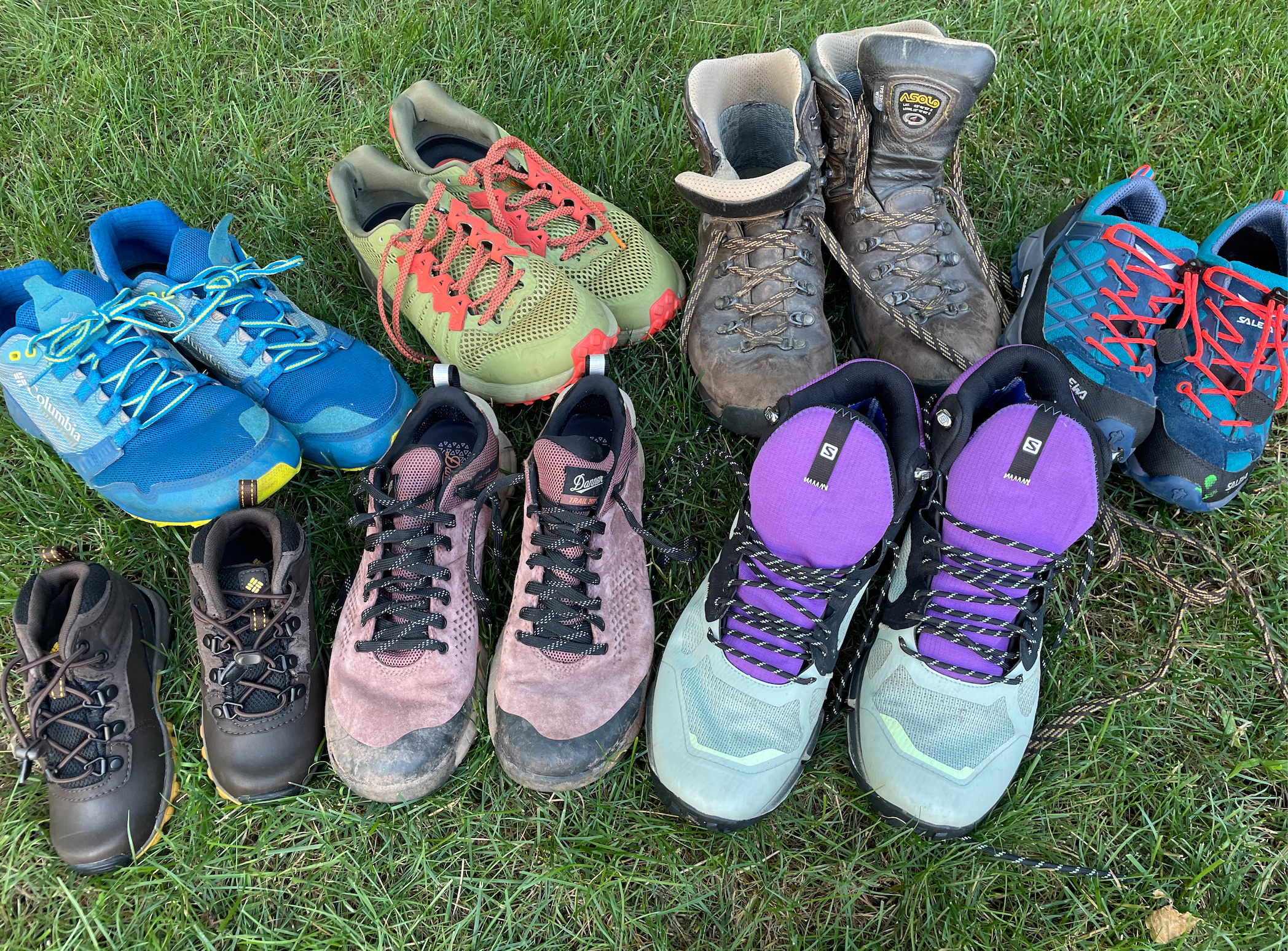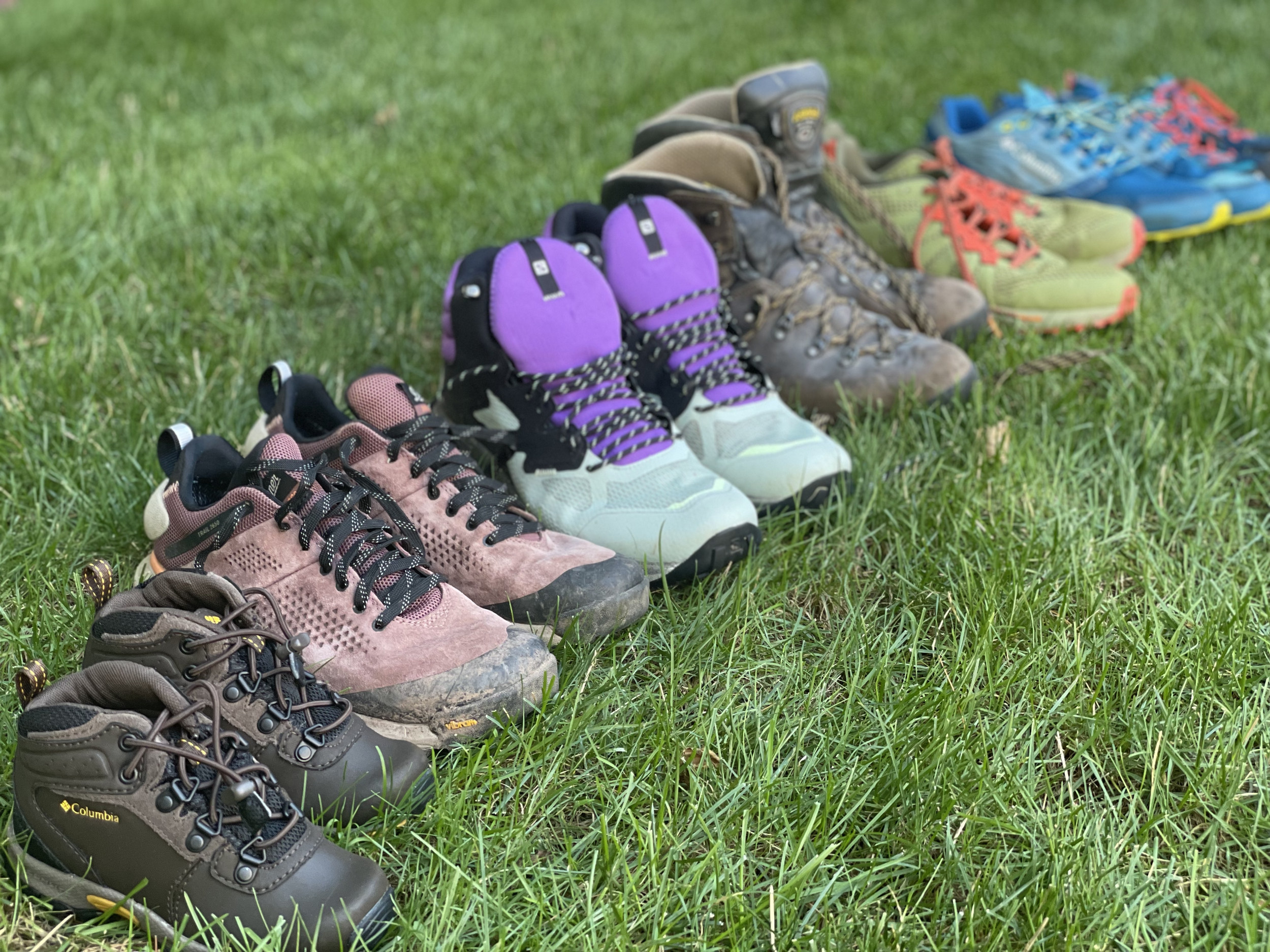
What’s the Difference Between Hiking Boots, Hiking Shoes, and Trail Runners, and
What Should You Wear On Your Feet On Your Next Trek or Trail Jog?
So you’re headed out for an exciting day hike, ey! Better pull on a trusty pair of hiking boots, then! Or should you wear hiking shoes for a day hike?
Are trail running shoes OK for a hike? Are hiking shoes OK for a trail run? When should you wear hiking boots, then? Should you maybe just skip the whole thing and stay inside?
No. No. And a thousand times no. Fear not! We’ll get this all cleared up for you and will get you out there on the trail in no time. To help us clear up the whole hiking boot vs. trail shoe vs. hiking shoe conundrum of it all, we enlisted the help of an expert, Jory Brass, Backcountry’s Switchback Gearhead and the Editor in Chief of Hiking Feet, an outdoor product reviews site literally spot on for this very topic. In other words, we found the right guy. So let’s let him do most of the talking.
What are the differences between hiking boots, hiking shoes, and trail running shoes?
“The main difference is that hiking boots, hiking shoes, and trail running shoes each offer different tradeoffs between weight savings and support,” Jory told Dad Gear Review. “Hiking boots generally offer the best foot and ankle support, traction, weather protection, and durability; however, that also makes them heavier than hiking shoes and trail runners, which may zap a little energy if you hike fast enough or far enough.”
“Trail running shoes weigh less than hiking boots and hiking shoes and have the shortest break-in times and drying times,” Jory went on. “However, they provide less foot and ankle support than true hiking footwear and often wear out hundreds of miles earlier than a good pair of hiking boots or shoes.”
“Hiking shoes should be lighter than hiking boots and more supportive and durable than trail runners. At the same time, low cut hiking shoes don’t provide as much foot and ankle protection as hiking boots or as much weight savings as trail running shoes.”
Got all that? So far it’s mostly a question of taking on more weight in the name of added support, with a need to consider ankle protection if you’ll be on particularly dicey terrain.
“Smart buyers will consider those tradeoffs when choosing hiking boots, hiking shoes, or trail running shoes,” Jory said. “If support is most important to you, you should probably start with hiking boots or a sturdier hiking shoe. If weight savings is most important to you, trail runners are the best place to start. Hiking shoes are the classic compromise between weight savings and support.”

When is one of these types of shoes more appropriate given terrain, activity, and gear?
“There’s no consensus when it comes to choosing hiking boots vs. hiking shoes vs. trail running shoes,” Jory Brass said. “As with most outdoor gear decisions, the key is choosing the option that best matches your body, the terrain you hike, and your hiking style.”
“Overall, hiking boots often work best for harder hikes and backpacking trips and for hikers who carry extra weight or need more ankle support. Hiking shoes tend to work well for day hikers who don’t have a history of foot or ankle injuries. Trail running shoes are most popular with fast hikers and ultralight backpackers, especially thru-hikers on long distance trails like the Appalachian Trail or Pacific Crest Trail; however, they can also work for hikers who prefer the feel of running shoes and don’t need much support or durability for the kinds of hiking they do.”
“In the end, though, I recommend you ‘hike your own hike.’ Hikers should feel free to wear what they want—and to let other hikers wear whatever they want without pestering them to wear whatever you wear on your hikes!”
Trail Running Shoes are a lightweight option perfect for moving fast with minimal gear on your back
Are there times when it's a bad idea to wear one of these types of footwear?
“Absolutely.” Jory told Dad Gear Review. “For example, heavy-duty hiking boots would be overkill if you’re a casual hiker who mostly sticks to easier trails. That extra stiffness and support won’t be comfortable — and ironically could hurt your feet — if you’re not carrying extra weight or walking om tough terrain. Most thru-hikers have also abandoned hiking boots on long distance trails because they’re heavier, wear warmer, and don’t dry overnight. That can make a difference if you’re pounding out 15 to 20 mile days for several months on the Pacific Crest Trail or Appalachian Trail.”
“Most hikers avoid trail running shoes in winter since they don’t offer much weather protection. Trail runners’ limited support and durability also may be deal-breakers if you mostly hike steep and gnarly terrain that puts a lot of pressure on your feet, ankles, and shoes. For example, I’ve had a couple pairs of expensive trail runners that only lasted 60 miles, thanks to the rocky trails in my area.”
“Low-cut hiking shoes and trail running shoes may also be limiting in mud, snow, and winter weather. Your feet will probably stay warmer and drier in waterproof hiking boots.”
hiking shoes offer excellent stability and traction and are a great choice for varied terrain
What should someone consider when choosing a hiking boot? And a hiking shoe and trail runner?
“Fit should always be your first concern,” Jory Brass said. “The best hiking boots, hiking shoes, and trail running shoes in the world will suck if they don’t fit your unique feet.”
“After fit, the key is matching your footwear to your body and your hikes. For most hikers, the smart approach is to buy the lightest option that provides the support your body needs for the specific hikes you do.”
“However, that level of support varies for each of us, based on the strength of our feet and ankles, the terrain we hike, the speed and difficulty of our hikes, and how much weight we’re carrying.”
In general, you may need more support if any of these are true:
You mostly hike gnarly, steep terrain with plenty of rocks
You have a history of foot or ankle injuries
You’re a less experienced hiker whose lower body isn’t conditioned for hiking
You’re carrying a moderate to heavy pack
In general, you may need less support if you:
Mostly day hike well-maintained trails
You’re an experienced hiker with a healthy lower body that’s built up for hiking
You tend to hike fast and light with a light pack (or no pack)
The key is to know your body and to know yourself as a hiker. With experience, you can learn how much support is enough (but not too much) and light enough (but not too light) for your body and your hikes.”
hiking boots offer the most support and stability, protecting ankles on tricky terrain, and helping your feet absorb gear weight
What are common mistakes people make when choosing/using these types of footwear?
“My mistake when I was starting out was buying too much boot — boots that were stiffer and heavier than I needed for my day hikes. With trail running shoes trending right now, it seems like more people now make the opposite mistake: buying lightweight shoes that don’t have enough support for their bodies or the terrain they hike. Again, there’s no consensus on hiking boots vs. hiking shoes vs. trail running shoes; the key is finding the best fits for our unique feet and best matches for our hikes.”
“Many people also make the mistake of crowdsourcing footwear recommendations on social media. It won’t take long for a hundred strangers to recommend whatever they wear – without knowing anything about you, your feet, or your hikes!”
“Outdoor industry professionals do just the opposite. At Backcountry, for example, Gearheads like me won’t recommend any boots or shoes without first asking qualifying questions:
Where do you do most of your hiking?
Have you had any foot or ankle problems?
Do you need a narrow, standard, or wide fit?
What kinds of hiking or backpacking do you?
How much weight will you be carrying?
What’s most important to you: support, price, or light weight?
Only then can we offer helpful recommendations to help customers narrow down their choices to the best hiking boot, hiking shoe, or trail running shoe for them.”
And now that you know the kinds of questions the professionals would ask you, you can ask yourself the same queries, and then you can choose the best hiking boots, the best trail running shoes, or the best hiking shoes for your next adventure.




